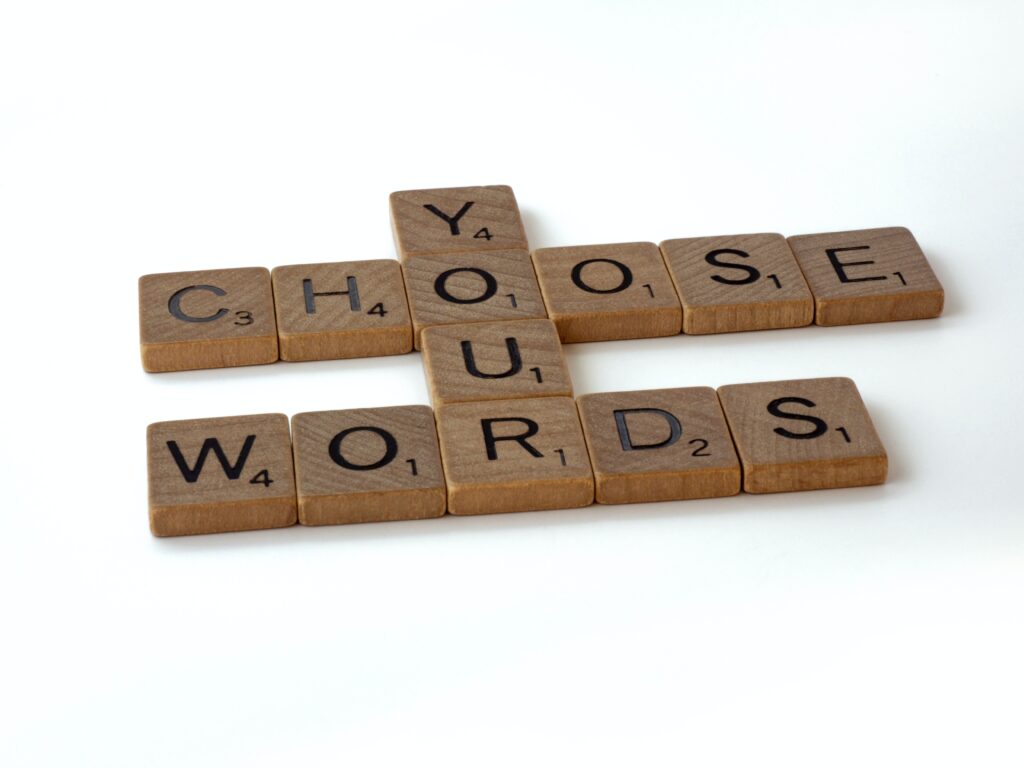Your language has power – use it wisely.
Language shapes the way we think. When we talk, we don’t only talk to each other. We use our language. It doesn’t matter where you are from and which national language you are using. What matters is how we use our language for ourselves and others.
How do you want to talk about yourself? And why can’t you use the same words of kindness, and love for yourself as you use for others?
Currently, I learned a lot about Emotional Intelligence and it made me even more aware of how important our language and the communication skill is. If it is in a small conversation like we have it at the coffee kitchen in our offices or a debate in front of 1000 People. How we use our language is how we present ourselves to the world. And it makes no difference if you are talking in person or writing it. Wrong words or the wrong use of words can hurt people anyway.
Are you mindful of the language you use? What is okay and what is not? Have you ever thought about how you communicate with people and how it could make them feel? Are we in some topics specifically walking on toes to just not make any mistake but forget about how we offend others by talking without caring our language?
Do you know there is already a movement of its kind that encourages people to be mindful of the language they use? Have you heard of “inclusive language”? I too was unaware, until I stumbled upon it and the idea itself impressed me a lot.
An active way of doing it is choosing inclusive language as a solution.
I would like to start with the definition of inclusive language.
It is the language that proposes to avoid the use of certain expressions or words that might be considered offending or alienating to particular groups of people.
Now to dive into this topic we need to go closer into these words and their use. Because what word we use is a decision, not only a habit. We own 171’146 words in current use in the English language according to the Oxford English Dictionary. So why do we only use the one we know for certain things without thinking twice about their meaning.
Did you know, your words can be hurtful? Can make you less approachable? Might be offensive?
Can create an inclusive environment? Can we promote kindness and compassion?
To give you some examples of what I am talking about and let me start with a negative example.
I know a beautiful autistic boy but, I still love him.
What sounds wrong in this sentence? What feels wrong for you? All in all, it is not a bad sentence, it is not meant to hurt anybody, not the boy, not his family, actually no one. What do you think, why it will still hurt him? Why he might feel he is doing wrong or feeling unwanted? Let me explain.
Does it matter if he is a boy or a girl? Why can’t I just say I know a beautiful boy and I love him? Does his disability makes such a big change if I love him or not?
No one in the entire world should be called by his disability or be reduced to it. Did this sweet innocent child choose autism? No, of course not.
And then there is this one small word which changes the whole meaning. BUT. If you think about yourself, how many times someone used this small word and it hurt you. Deeply. I love you BUT. You did a great job BUT. Language can hurt, even if we are not wanting to hurt. It can happen. mistakes can happen.
So let me rephrase this sentence now in two versions. First version if it needs to mention autism and also here I want to admit it is good to talk about it, to make the world aware of it to make these important topics normal and include them in our knowledge and share awareness. It is needed to, but it is important, to use the right language. Because no Person with autism (or anything else that troubles the person dealing with it) deserves to be reduced on that. The second Version is without mentioning that, showing the meaning for the first sentence in inclusive language.
I know a beautiful child who has autism, and I love this child endlessly.
or
I know a beautiful child whom I love endlessly.
Do you feel the difference? Now that we removed this negative meaning and pointing out to something that isn’t needed because it is painful.
Words may not intend to exclude or hurt others but mistakes can be made. And these mistakes can have a significant impact on other people. So it is important to be mindful of how we communicate to help create a supportive and inclusive environment.
Try it for yourself, how does it makes a difference for you and for others in being aware, what language you use. I would love to hear your story or experience in the comments below, but please in the inclusive language if I may ask you.

Thank you, dear reader, for giving me your time today, I hope I could give you something to take with you on your journey.
Love what you do,
Astrid
Be First to Comment